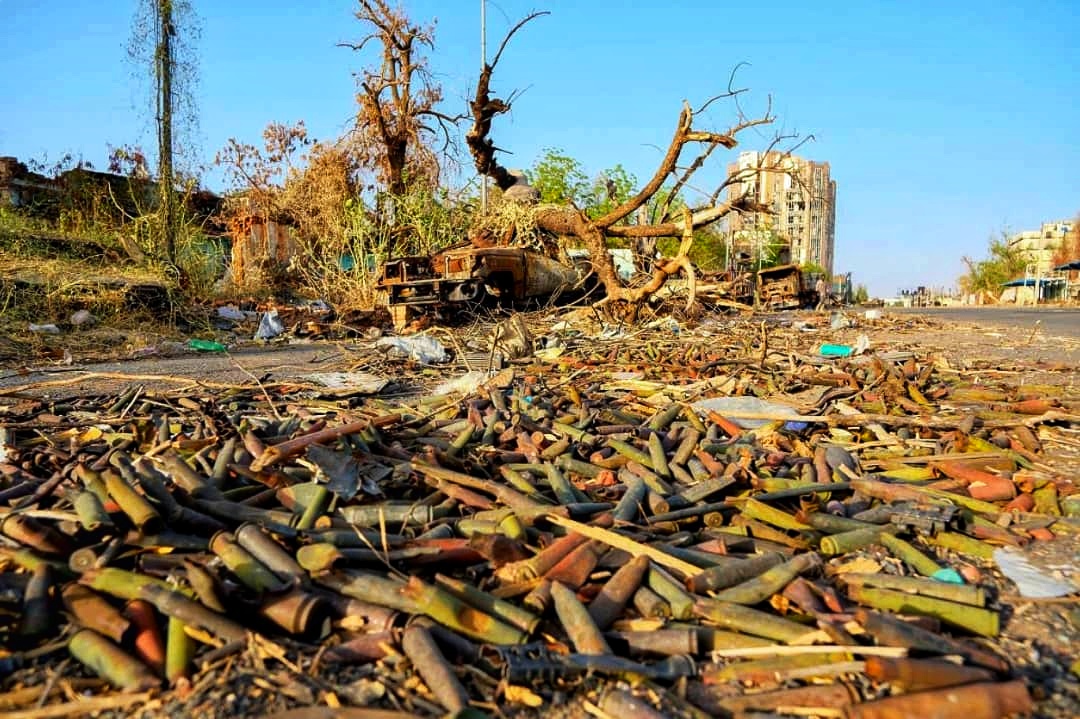Unexploded Shells: A Hidden Threat Haunting Sudanese in Their Homes
Mashawir – Agencies

Abdelaziz Ali, wearing his glasses and gray beard, emerged trembling from an elementary school in Al-Amarat district, central Khartoum. Like thousands of others, he had returned to inspect buildings recaptured by the army after two years of civil war—only to find a new threat lurking in the rubble: an unexploded shell beneath a pile of old fabric.
Ali, 62, was an administrative staff member at the school before the war erupted in April 2023, following the Rapid Support Forces’ (RSF) incursion into the city. Standing outside the school, he asked, “How could I not be afraid?” He pointed to a 40-centimeter-long shell, resembling an anti-tank round, and added, “This is a children’s school—these things must be removed, but we cannot do it ourselves.”
A Security Plan
Ammunition and rockets are scattered across streets, homes, schools, and shops throughout the city, as families begin to return to buildings once controlled by the RSF.
Sudanese and UN demining teams are surveying the situation and working to secure the areas, but they say more personnel and funding are needed, especially after U.S. aid cuts. In Al-Amarat, Ali pointed to more shells lying on a dirt path between the school and a kindergarten, while several rockets were seen in destroyed vehicles.
A guard at another building said authorities had removed ammunition and drones from the basement, but anti-tank missiles remained. “We fear a single explosion could destroy the entire place,” he added.
Over 100,000 people have returned since the army regained control of Khartoum and much of central Sudan amid a conflict sparked by plans to integrate the RSF into the armed forces. The RSF still controls large swaths of western Sudan and has shifted tactics from ground raids to drone strikes targeting infrastructure in army-held areas.
Ongoing Efforts
Sudan’s National Mine Action Center announced the destruction of over 12,000 explosive devices since the war began. Its director, Major General Khalid Hamdan, said an additional 5,000 devices had been found recently as operations expanded to newly recaptured areas. Reports indicate that at least 16 civilians have died and dozens have been injured by munitions explosions in recent weeks, with fears the real death toll may be higher.
Jamal Al-Bushra, director of the Mine Action Center office in Khartoum, said, “We currently have only five working teams in the capital.” Efforts are focused on major roads, government buildings, and medical centers—areas that saw the heaviest fighting. Hamdan noted that full-scale demining and surveying would require $90 million.
Teams manually collect shells, carefully placing them in old bags and boxes or on a bed of soil on the back of small metal-sided trucks for safe transport. Some of these efforts are supported by volunteer groups. Halou Abdullah, who leads one such team in Omdurman’s Umbadda district, said, “We receive 10 to 15 reports daily and try to remove as many devices as possible.”
Crises and Challenges
The UN Mine Action Service (UNMAS) nearly shut down in March after U.S. funding cuts until Canada stepped in with support. Sudan’s program director, Siddig Rashid, said, “We need hundreds of teams, but we only have a few,” noting that travel permit issues also hinder their work. “It’s extremely worrying because these areas need to be cleared by specialists before civilians return,” he stressed.
Rashid emphasized that demining teams have only conducted surface-level surveys, especially outside Khartoum, which has also suffered severe damage. Without proper inspection, residents are left to protect themselves.
A 16-year-old boy lost his left arm and sustained serious injuries when a shell exploded as his family was clearing rubble at their home on Tuti Island, where the Blue and White Niles meet. His uncle, standing by his hospital bed in Omdurman, recounted, “While cleaning the house last Saturday at 11:30 a.m., we heard an explosion. It turned out to be a 23mm round hidden in a chair—it went off without warning.”




